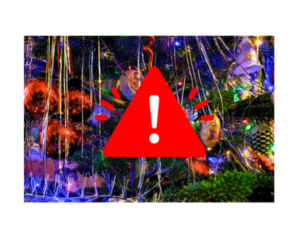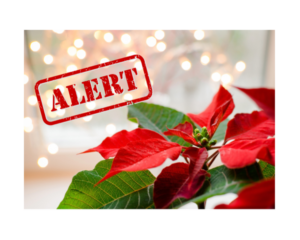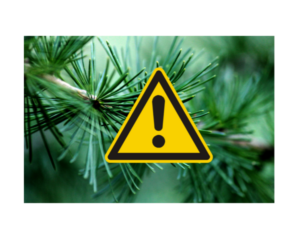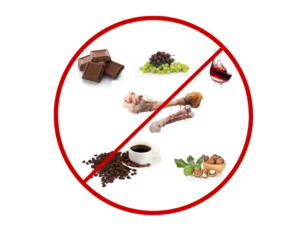Some common holiday items can be dangerous to pets. Below is some helpful information and other tips to help keep your pets safe this holiday season!
DECORATION HAZARDS:
- Tinsel & Ribbons: The most common and serious holiday hazard for pets. Ingesting these can cause serious blockages and may require surgery to treat.
- Scented Candles & Soaps: Pets may confuse candles and soaps with tasty treats since they smell so enticing! Keep these items safely away from curious noses and mouths!
- Ornaments: Pets may also confuse decorations and ornaments with ‘toys’ and not realize they are unsafe for them to chew on/eat!
TOP SAFETY TIP: Make sure to keep the lowest branches of your tree free of tempting tinsel
(which we recommend avoiding altogether) AND other small ornaments that are tempting
to play with, chew on, or eat.
PLANT & FLOWER HAZARDS:
- Some varieties of plants and flowers are toxic to cats and dogs: For example, poinsettias are mildly toxic to cats and dogs, but other festive florals, like lilies, can be extremely toxic – especially to cats. The following chart lists some of the most common poisonous holiday plants for pets:
|
Azaleas |
Holly |
Lily |
|
Amaryllis |
Ivy |
Mistletoe |
|
Evergreens |
Juniper |
Poinsettias |
CHRISTMAS TREE HAZARDS:
- Closely watch to make sure your dog or cat is not ingesting real Christmas tree water that can cause gastric distress OR real or artificial needles that can puncture their intestinal lining and/or cause blockages, stomach upset and discomfort
FOOD HAZARDS:
- Chocolate, caffeine, alcohol, grapes, raisins and some nuts: These holiday season staples can be extremely toxic and should always be out of reach to pets.
- Cooked bones: All cooked bones—especially poultry bones—should always be avoided as they can cause gastric upset & blockages, splinter & perforate intestines, and cause tooth breakage.
TOP SAFETY TIP: When disposing of cooked turkey carcass/bones, do not put them in a household garbage can or countertop compost container. Instead, immediately take them out to your outdoor garbage or compost bin – ensuring these are not accessible to your pets.
THE INFORMATION LISTED ABOVE IS A GENERAL LIST & NOT A COMPREHENSIVE LIST OF ALL HAZARDS: IF YOU SUSPECT YOUR PET HAS INGESTED SOMETHING POTENTIALLY DANGEROUS, IMMEDIATELY CALL YOUR VETERINARIAN OR THE 24/7 PET POISON HELPLINE AT 1-800-213-6680.





